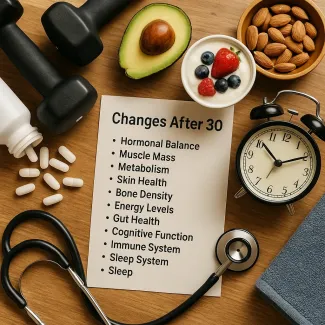
Eating Rhythm and the Gut Clock: Why Timing Shapes Digestion
How circadian biology influences gut motility, comfort, and daily energy
The body does not digest in isolation. Digestion follows rhythm, coordinated by circadian signals that influence enzyme release, gut motility, insulin sensitivity, and repair processes overnight. Meal timing acts as a cue to this internal clock. When eating patterns consistently align with biological rhythm, the digestive system tends to feel lighter, more predictable, and less reactive. When timing drifts—especially toward late-night intake—subtle signals can emerge: heaviness after dinner, morning sluggishness, irregular bowel movement, or energy dips later in the day.
The Gut’s Circadian Axis
Digestive function is not constant across the day
The circadian rhythm regulates stomach acid production, pancreatic enzyme release, intestinal contractions, and metabolic handling of nutrients. During the earlier part of the day, the body is generally more metabolically prepared. Insulin sensitivity tends to be higher, gut motility more active, and energy utilization more efficient.
In contrast, evening physiology shifts toward repair and slowing. Gastric emptying gradually decelerates. The migrating motor complex—the cleansing wave that sweeps residual food through the intestine during fasting intervals—operates most effectively when consistent breaks between meals exist.
When meals regularly occur late, the system may not fully transition into restorative mode. Over time, this pattern can overlap with broader metabolic shifts such as those described in Glucose Swings and Why Energy Starts Dipping in Midlife, where rhythm and energy regulation intersect.
Why this signal exists
The digestive tract evolved to anticipate feeding during daylight. Hormonal signals, including cortisol rhythm and melatonin onset, coordinate feeding with activity cycles. When timing misaligns, the system does not immediately fail—it adapts—but adaptation may come with subtle inefficiency.
Pattern Recognition: When Timing Begins to Matter
Many adults notice small but recurring signals:
- Heaviness or mild reflux after late dinners
- Reduced appetite in the morning despite evening hunger
- Energy dip two to three hours after a rushed meal
- Irregular bowel patterns on weekends compared to weekdays
- Increased snacking when meals lack structure
These patterns are not isolated symptoms. They often reflect rhythmic inconsistency.
The overtime effect
Irregular timing rarely produces immediate dramatic change. Instead, the body gradually shifts. Evening digestion becomes slower. Morning motility may feel delayed. Appetite cues may become less reliable. Over years, this can blend with age-related shifts in insulin handling, gut microbiome diversity, and hormonal modulation.
Common Timing Patterns and Their Physiological Context
Three structured meals
A traditional breakfast–lunch–dinner rhythm allows digestive phases to complete. Clear intervals between meals support migrating motor complex activity and improve awareness of natural hunger cues.
Three meals with a light snack
For individuals with high stress or fluctuating glucose patterns, modest spacing may reduce digestive overload while preventing large evening meals.
Early time-restricted rhythm
Some adults naturally gravitate toward earlier intake with minimal late-night eating. This pattern often aligns closely with circadian physiology. However, consistency matters more than rigidity.
What Often Overloads the System
The gut responds not only to what is eaten, but when and how often.
- Frequent grazing interrupts fasting-related motility cycles
- Heavy evening meals overlap with melatonin onset
- Large gaps followed by overeating strain gastric emptying
- Eating during emotional stress increases sympathetic dominance
These behaviors do not cause damage by default. They increase the likelihood of digestive inefficiency when repeated without rhythm.
How the Body Responds in Everyday Life
Support, preserve, protect
To support the gut clock:
- Preserve consistent meal windows across weekdays and weekends
- Protect fasting intervals that allow gut clearing waves to function
- Support earlier intake when possible, especially main caloric load
What often overburdens digestion
- Repeated late-night caloric intake
- Erratic meal timing that shifts daily
- Combining high-fat, high-volume meals with low physical activity before sleep
Habits that directly influence rhythm
- Exposure to morning light
- Consistent sleep schedule
- Calm eating environment
- Awareness of natural hunger vs. emotional appetite
Thinking in rhythm rather than restriction
Digestive health benefits from rhythmic consistency, not strict control. The environment—light exposure, stress levels, work schedules—interacts with meal timing. Regeneration happens predictably when signals are stable.
What has long-term observational value
- Morning appetite return
- Ease of bowel movement
- Evening comfort before sleep
- Stability of daytime energy
Age-Related Shifts in Timing Sensitivity
After midlife, insulin handling and circadian robustness may subtly change. The digestive system may feel less tolerant of irregular late meals. Hormonal modulation, including evening cortisol flattening, can influence hunger cues and overnight digestion.
This does not require dramatic dietary overhaul. It often calls for awareness of timing patterns and gentle alignment with internal rhythm.
Digestive Rhythm as a Signal, Not a Rule
Meal timing is not a universal formula. It is a conversation between environment and physiology. When rhythm aligns, digestion tends to feel lighter, more predictable, and less reactive. When rhythm drifts, the body often signals through mild discomfort, fluctuating appetite, or energy variability.
Understanding this connection increases personal control without imposing rigid structure. The digestive system favors consistency, alignment with daylight, and intervals that allow restoration. Over time, small adjustments in timing can feel more sustainable than drastic changes in content.
FAQ questionIs eating late at night really that disruptive for digestion, or is it overstated?
Late-night eating is often discussed in connection with digestion because the body’s internal clock gradually shifts toward rest in the evening. In that context, people usually notice a sense of heaviness, slower digestion, or mild reflux after late dinners. This is less about a single meal and more about rhythm over time. When eating consistently overlaps with the body’s wind-down phase, digestion may feel less efficient.
It’s often mentioned that the digestive system is more active earlier in the day. In everyday life, it makes sense to think about whether evening meals feel lighter and more comfortable when eaten earlier rather than later.
Editor’s note: In practice, many adults first notice timing effects not as pain, but as subtle morning sluggishness or reduced appetite at breakfast. That quiet shift often says more about rhythm than any single symptom.
FAQ questionIf I skip breakfast because I’m not hungry, does that harm my gut rhythm?
Not necessarily. Some people naturally feel less hungry in the morning, especially if dinner was late or heavy. In such a context, reduced morning appetite often connects to how the previous evening’s intake aligned with circadian timing.
Over time, people may observe that when dinner is earlier and lighter, morning hunger returns more predictably. The key theme is consistency rather than forcing meals. In everyday life, it has value to reflect on whether hunger cues feel stable across the week or fluctuate based on irregular timing.
Skipping breakfast itself is not automatically problematic. What often matters more is whether the overall daily pattern supports clear intervals for digestion and natural appetite signals.
FAQ questionWhat if my schedule only allows dinner after 9 PM—am I stuck with digestive discomfort?
Many adults face late schedules due to work, commuting, or family life. In that context, digestive comfort is often influenced by meal composition, portion size, and consistency rather than the clock alone. People usually notice that very large or heavy meals late at night feel different from lighter, structured ones.
It is often associated with how close eating occurs to sleep onset. When meals consistently overlap with the body’s shift into restorative mode, mild discomfort may become more noticeable over time.
Practical note: From an editorial perspective, it’s interesting that people who cannot change dinner time often feel better focusing on rhythm—keeping similar timing daily—rather than chasing perfection. Stability tends to feel more sustainable than constant adjustment.
FAQ questionDoes eating small snacks throughout the day keep digestion “active” in a healthy way?
Continuous grazing is a common habit in many workplaces, especially where long desk hours blur meal boundaries. It’s frequently assumed that constant small intake keeps metabolism steady. However, digestion also relies on natural pauses. The migrating motor complex—the internal cleansing wave of the gut—operates most clearly during breaks between meals.
When snacks interrupt those intervals repeatedly, some individuals report feeling bloated or less aware of true hunger. This does not mean snacking is harmful by definition. Rather, it often connects to whether meals feel structured or scattered.
In everyday life, it can be useful to notice whether small, frequent eating leaves the body feeling settled or restless. Over time, patterns become more informative than single days.





